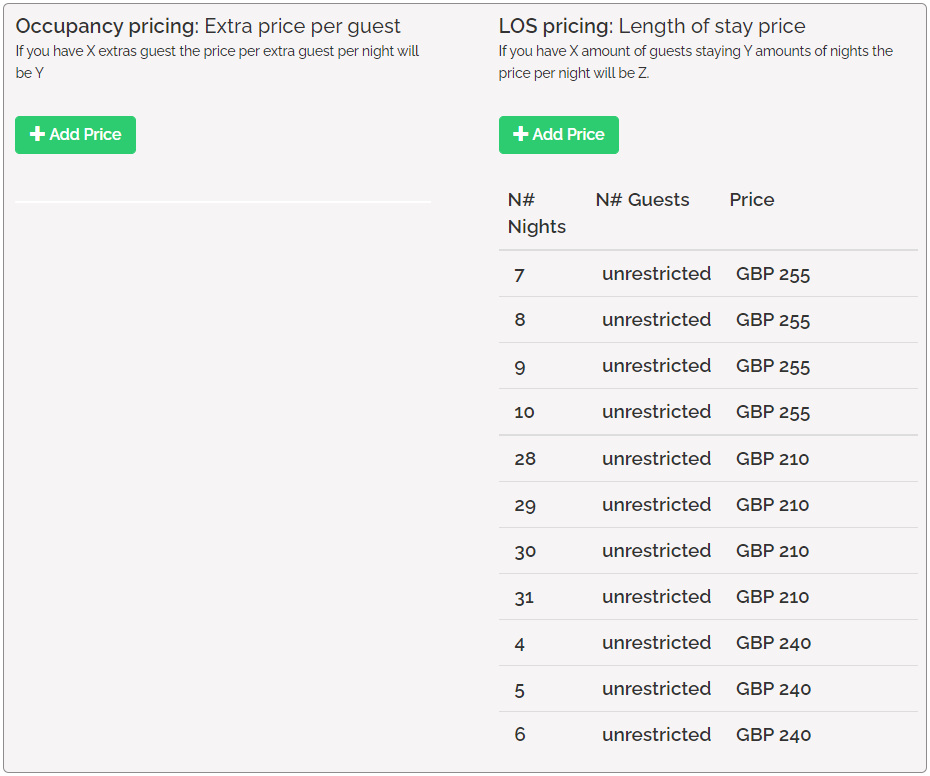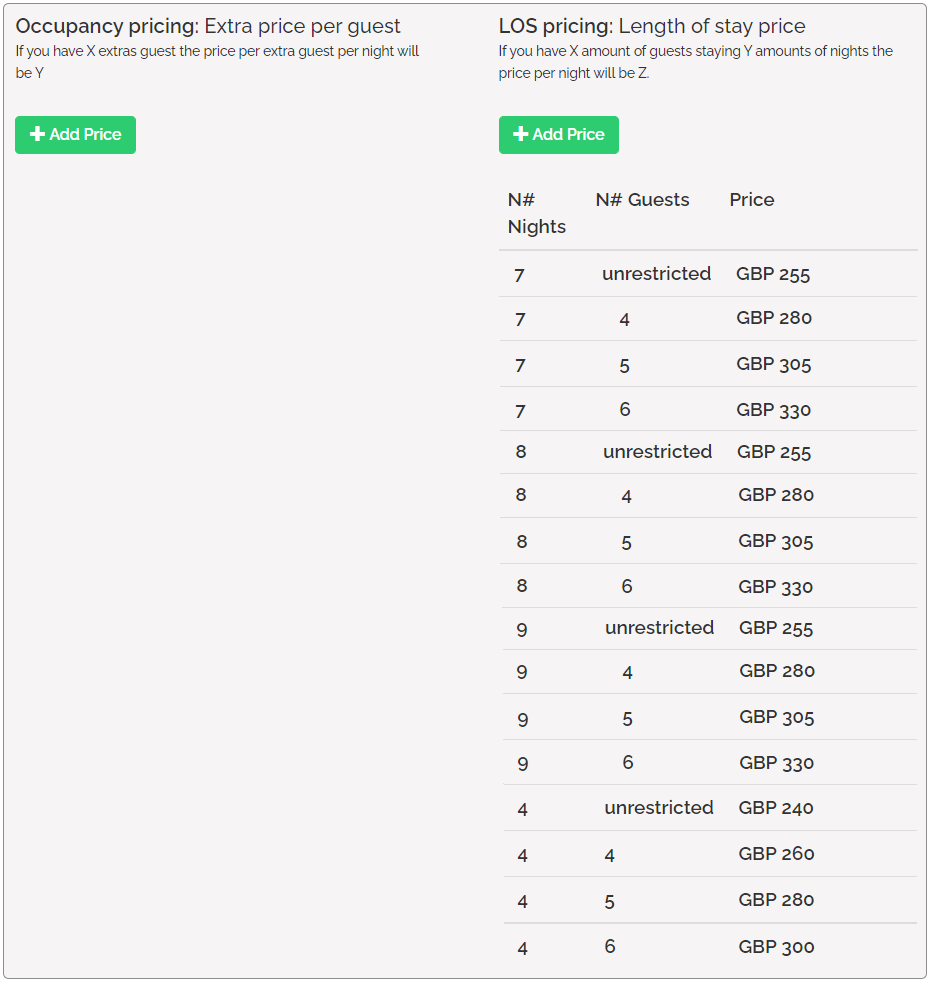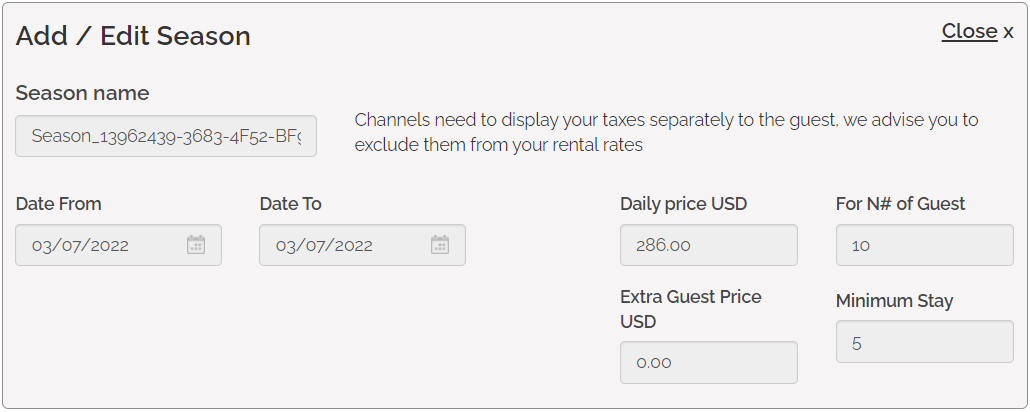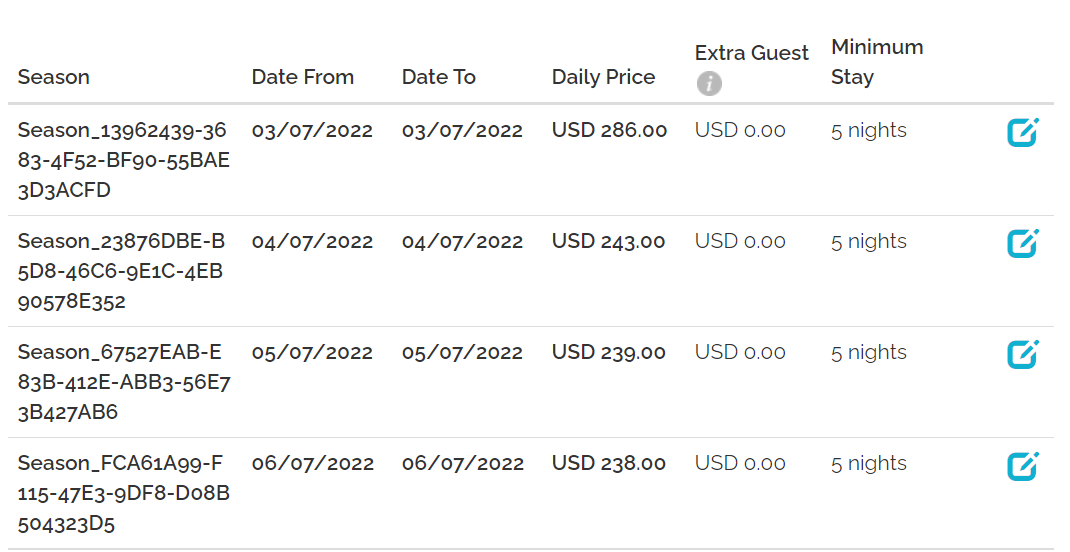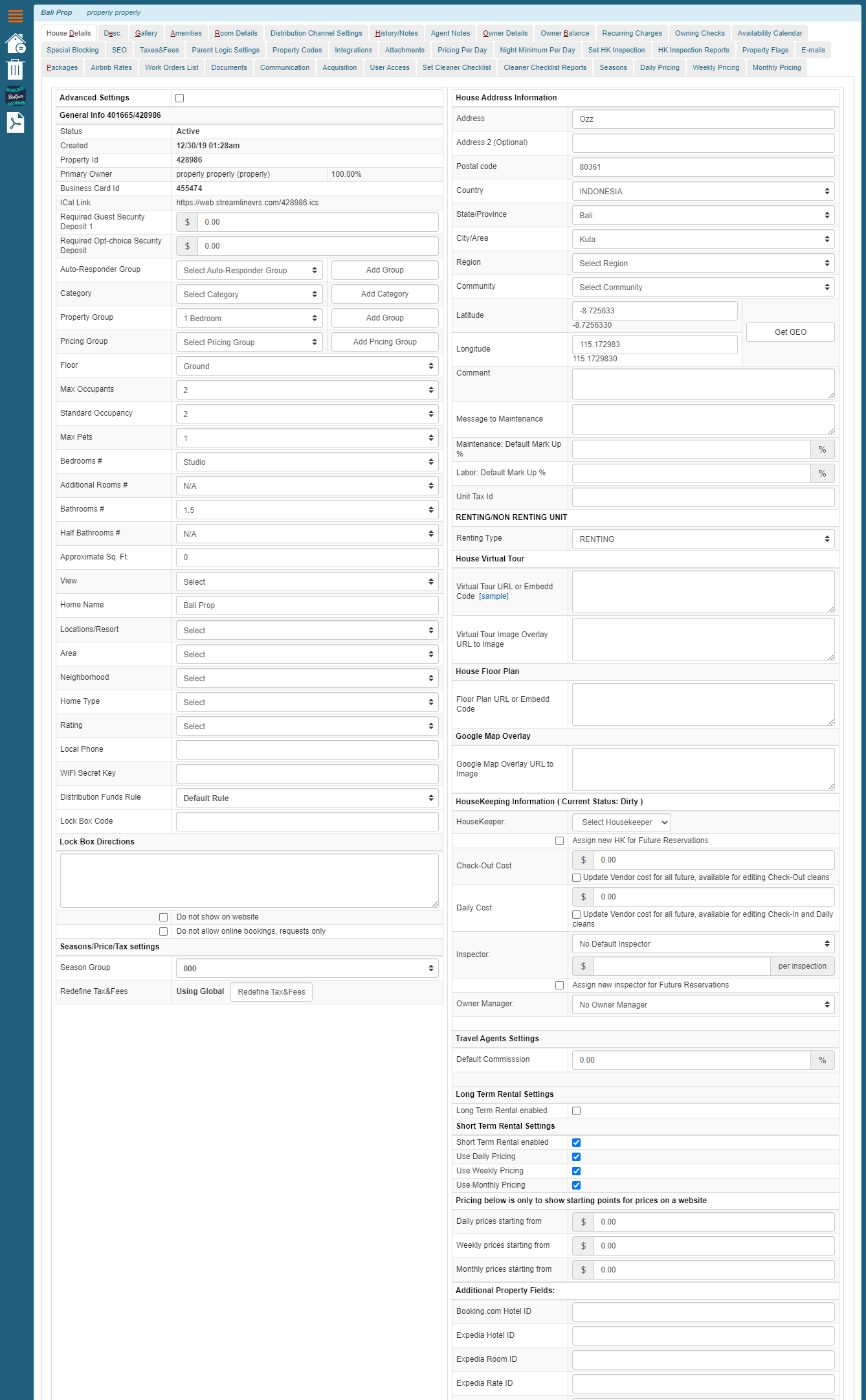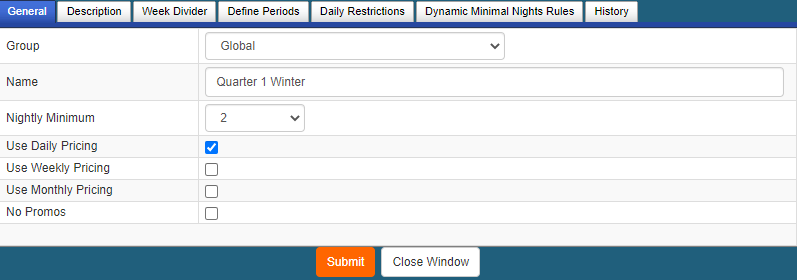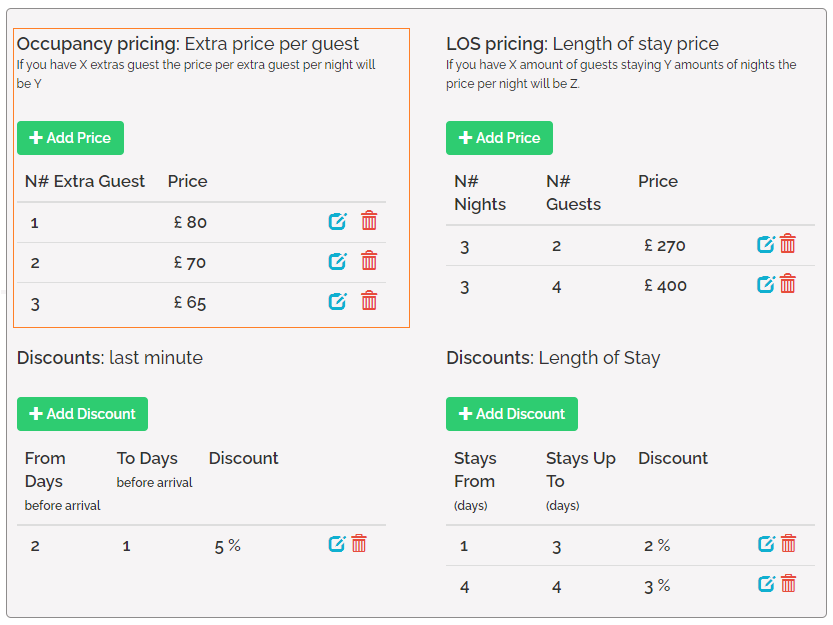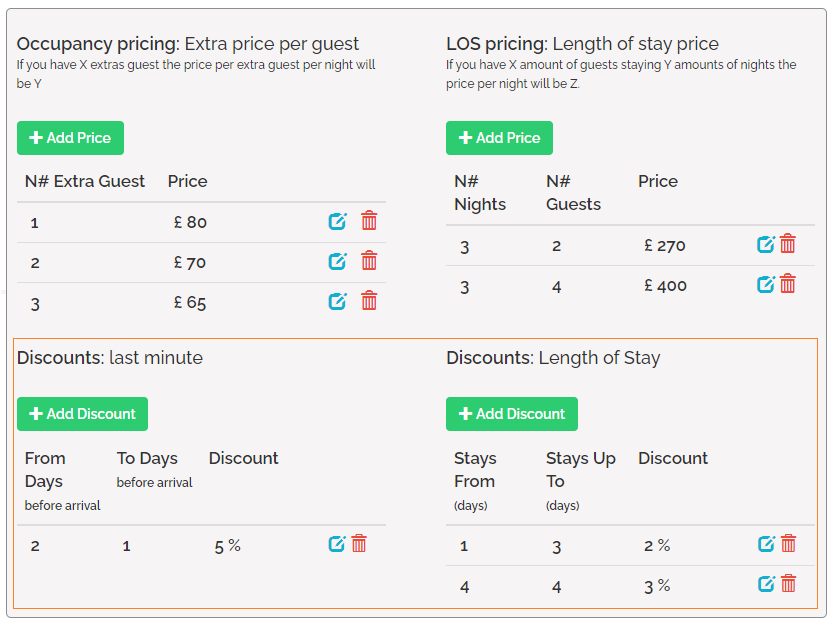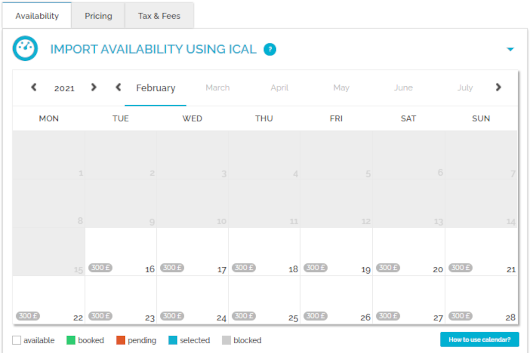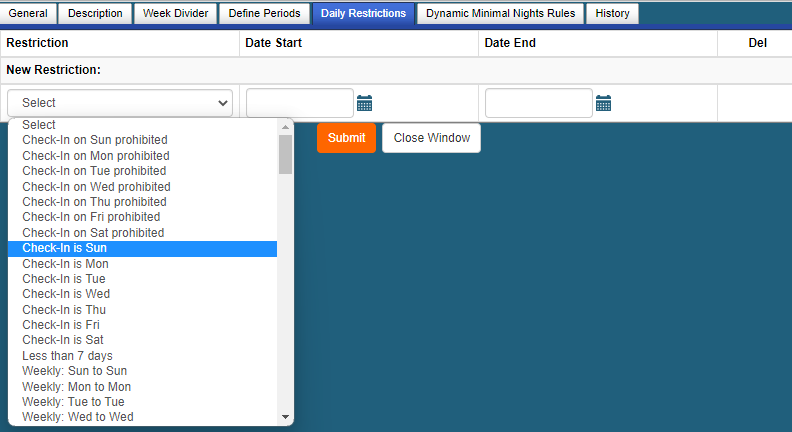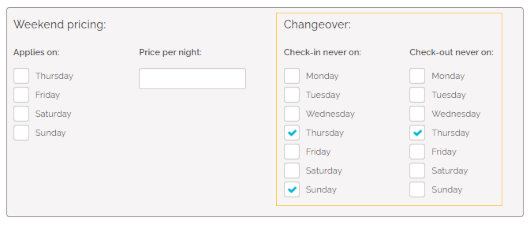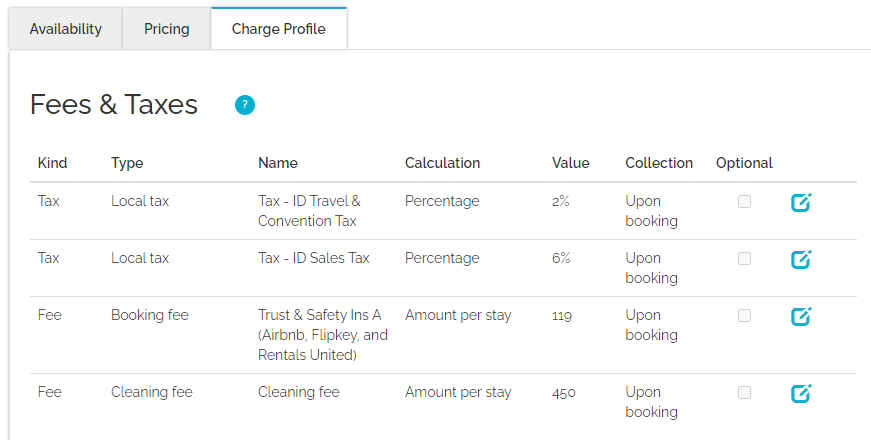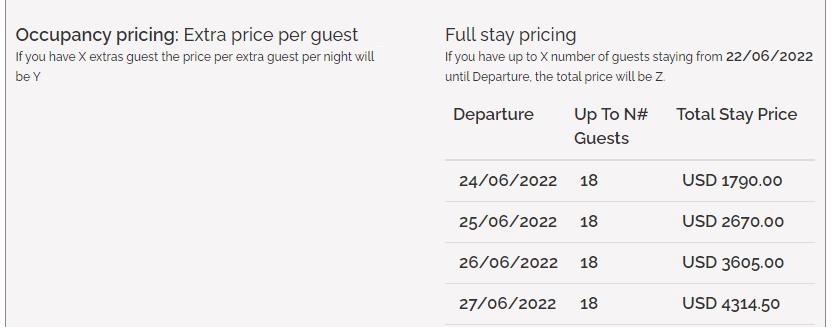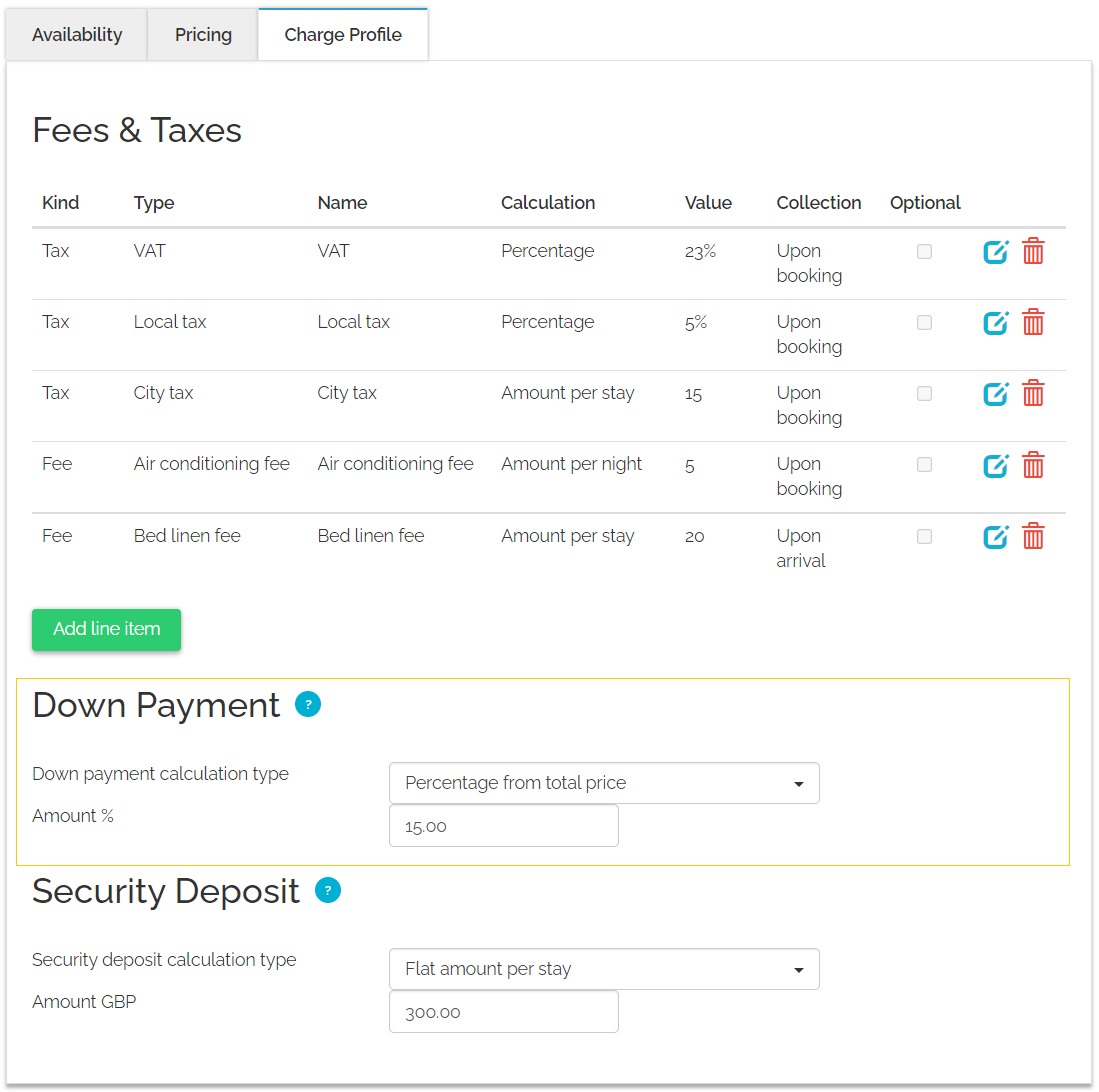Step 5: Price and availability
LOS pricing model
In LOS pricing, it is possible to specify fixed nightly pricing plans for different numbers of nights and (optionally) for different number of guests. It means that your prices can depend on the number of booked nights and guests staying at your property.
Here is how LOS pricing works. For example, let's say your Daily price is 200 USD. If you continue using the Daily price model and one guest decides to book your property for three nights - the total is 600 USD.
In case you use LOS pricing, you can easily set that one guest pays a different amount per night, depending on how many nights were booked. For example, 1 guest can pay 200 per night if a 3-night stay was booked - the total is 600 USD. But you can easily set that 1 guest can pay 190 USD per night if a 4-night stay was booked - the total is 760 USD.
You can do the same for the number of guests and set different prices for different cases.
The LOS prices are created with the use of the <discount> and <guestFees> element in the configurations described in the scheme. If you are interested in the LOS pricing model, please disregard the orange box. The orange box describes a situation when Discounts are created.

LOS prices if <discount> and <guestFees> are present
Have a look at the situation described in the blue box where two elements are available to read for Rentals United. First, the <discount> element contains data needed to calculate the base of the LOS pricing, that is LOS price per night for unrestricted number of guests.
Base LOS prices
The condition for Rentals United to take such prices into account is that the <percentOfRentDiscounts> element needs to have any range defined for the <forStaysOfNights> element. If it does, then the LOS record is created in each season for each settings in the <discount> element and every number of nights that fits in the <min> and <max> range.
The LOS record value is then calculated according to the formula:
{Daily price in the season} x (1 - <percent> x 0.01)
Below, you can find the relevant data passed in the code, as well as potential situation how it would look like in Rentals United platform. However, such a situation will never appear in the Rentals United platform and the screenshot serves only better visualization of how the system works.
|
|
Example: Daily price = 300GBP in the season that covers more than 31 nights.
In each season, LOS prices will be defined in the following way:
-
For each LOS record from LOS7 to LOS10, for 15% discount = 255GBP
-
For each LOS record starting from LOS28 to LOS31, for 30% discount = 210GBP
-
For each LOS record starting from LOS4 to LOS6, for 20% discount = 240GBP
Now you already know how base LOS prices are calculated, you can read more about LOS prices per different number of guests - LOSPP. Once the base LOS prices are calculated, they are modified with the data passed in <guestFees>.
LOSPP creation
Rentals United takes only fees of the <appliesPerGuestPerNight> type. These fees will be applied to seasons that start within the range specified by <whenStayDateIn> - see the code in the parentheses below. If such seasons cannot be found, then Rentals United extends the range of<whenStayDateIn>to <min> = current day's date; <max> = current's day date + 400 days.
A new LOSPP record with the given number of nights and the specified number of guests is created for each season. If no corresponding LOSX can be found, then such is created with the Daily price - see LOS prices if only <guestFees> is present.
For each guest from the <forGuestNumber> range, the LOS price is calculated according to the formula:
{LOS price} + (<amount> of <guestFees> OR <amount> of <NightlyOverride>) x (N of guest the calculation is for - <min> number of guests + 1)
|
|
Example: Daily price = 300GBP in the season that covers more than 31 nights.
In each season, LOS prices will be defined in the following way:
-
For each LOS record from LOS7 to LOS10:
-
For 4 guests = 280 GBP
-
For 5 guests = 305 GBP
-
For 6 guests = 330 GBP
-
-
For each LOS record starting from LOS4 to LOS6:
-
For 4 guests = 260 GBP
-
For 5 guests = 280 GBP
-
For 6 guests = 300 GBP
-
LOS prices if only <guestFees> is present
Have a look at the situation described in the green box where only one element <guestFees> is present, while the <discount> element is skipped. In this case, LOSPP prices will be calculated on the basis of the Daily price within a season.
In this case, the LOSPP pricing will be calculated on the basis of the formula:
{Daily price} + (<amount> of <guestFees> OR <amount> of <NightlyOverride>) x (N of guest the calculation is for - <min> number of guests + 1)
|
|
Example: Daily price = 300GBP in the season that covers more than 31 nights.
In each season, LOS prices will be defined in the following way:
-
For each LOS record from LOS7 to LOS10:
-
For 4 guests = 325GBP
-
For 5 guests = 350GBP
-
For 6 guests = 375GBP
-
FSP pricing model
FSP pricing model can be used if you are a PMS or an API user. It defines a fixed price for the whole stay, that is for an exact number of guests and nights.
-
Note that it will not be possible to make a reservation for a period in which prices are not defined.
-
Note that FSP pricing does not respect Standard number of guests or Maximum number of guests. Whatever is provided as the FSP records will be respected.
Example 1: Your standard number of guests = 4 and you provided prices only for 1 and 2 guests.
Result: The reservations with 3 and 4 guests will not be possible.
Example 2: Your maximum number of guests = 4 and you provided prices only for 5 and 6 guests.
Result: The reservations with 5 and 6 guests will not be possible.
Daily price model
Daily price model calculation is based on the values retrieved from various data fields. It allows for detailed pricing settings if set carefully. Also, Daily price model is based on seasons.
The season refers to a period of time when particular pricing is applied. It is possible to set as many seasons as required, varying in length and specification. The minimum settings require:
-
Season name,
-
Date range,
- Price.
Daily price

Daily price is the standard way of setting prices. It indicates the base price per night for the Standard number of guests.
Daily price is synchronized based on <nightlyRates> in the first place. However, if there are no <nightlyRates> prices defined, we will take the <nightlyOverrides> prices into account.
|
|
In Streamline VRS: Tools > Home > Daily Pricing |
Standard number of guests

Standard number of guests refers to the maximum number of guests included in the Daily price for whom the price does not change. If more guests than specified book a stay, the extra guests will be charged with the price set in the Extra guest price element.
|
|
In Streamline VRS: Tools > Home > Edit property > House details > Max. Occupants |
Extra guest price (N/A)
Minimum stay

Minimum stay indicates the minimum number of days a reservation can be made for. Guests will be not be able to book your property if they want to book stays shorter than minim stay. This value is mandatory to provide.
|
|
In Streamline VRS: Tools > Home > Switch to Seasons tab > Edit season > General > Nightly Minimum |
Weekend pricing (N/A)
Occupancy pricing

In Occupancy pricing, it is possible to specify pricing plans for different numbers of guests. The difference between Extra guest price and Occupancy pricing lies in fact that with Extra guest price the same price is applied for each extra guest. On the other hand, in Occupancy pricing it is perfectly possible to specify different prices for different numbers of guests. Note that Occupancy pricing takes precedence over Extra guest price.
|
|
Complimentary topics
Discounts
Discounts are applied in order to deduct certain amount from the price, provided the specified requirements are met by the reservation. Currently, there are two types of discounts:
LOS discount may be applied when criteria specified for the length of stay are met. For example, LOS discount may apply only for 3-days stays. Last-minute discount on the other hand is applied if the reservation is made within the specified time before the check-in day.
If you have any discounts set in Streamline VRS, they will be synchronized to the LOS discount field. This will happen when the <discount> element is passed to Rentals United and no <guestFees> element is available. This is the scenario described in the orange box.

Below, you can see the format they are received in as well as verify what discount models are supported by Rentals United.
|
|
Calendar
Calendar stands for the property's availability to rent. You can check here the availability of your property in the selected time frames. Once a reservation is inserted in Rentals United, the availability in the calendar gets blocked for this period. The calendar is updated automatically every time the availability of the property changes or at predefined times to remain up-to-date.
Every time availability is retrieved from Streamline VRS, Rentals United receives it in the following format:
|
|
In Streamline VRS: Tools > Home > Edit property > Calendar Availability |
Preparation Time Before Arrival

PTBA stands for Preparation Time Before Arrival. It is a general keyword to describe the minimum time a booking has to be made in advance in order to be accepted by the PM. The dates restricted by PTBA are normally set as not available already in the calendar. Hence, the PTBA data is already applied in availability and sent to the channel within the ARI data. The PTBA in Rentals United blocks the availability x hours from 23:59 of the day of arrival on the property's local timezone. For example if the PTBA is set to 6 hours, bookings will be accepted until 18:00 of the day of arrival, after 18:00 the calendar will be closed. If the PTBA is set to 24 hours, bookings will be accepted until 23:59 before the day of arrival, after that the calendar will be closed.
By default, Streamline VRS sets PTBA to 1 day for all properties due to possible restrictions in the Sales Channels. Nonetheless, the PTBA value can be greater. This means, PTBA set to 1 in Streamline VRS is displayed as 24 hours in Rentals United, 2 - 48 hours, 3 - 72 hours and so on.
|
|
For detailed description of how PTBA works, please see Preparation Time Before Arrival.
Changeover restrictions

Changeover restrictions specify whether check-in or check-out is allowed for a given day. This is a great option if you need the guests checking in and out to fit your schedule and it will help you avoid unexpected guests. If some days are restricted from changeovers, then your guests will simply not be able to select such a stay if the start or end day falls on a changeover-restricted day.
|
In Streamline VRS: Tools > Home > Switch to Seasons tab > Edit season > Daily Restrictions |
Tax and Fee
Tax refers to mandatory charges legally levied on particular types of goods, services and transactions, paid as a contribution to the state’s revenue, for example VAT or city tax.
Fee refers to mandatory or optional charges paid in exchange for particular services. These include:Charges for additional services, for example Internet access or shuttle.
Fees defined by local governments that do not fall into the tax category, for example environmental fees.
In Streamline VRS: Tools > Home > Switch to Tax & Fees tab |
In-rent fees
Streamline VRS in-rent fees are partially supported. They will be treated as in-rent if they meet certain requirements. If they do, they will be hidden from Charge Profile, applied on top of the rent and not displayed as separate line items to the guest.
Requirements if you use FSP pricing:
the fee is set as in-rent in Streamline VRS (<displayInRent> must be true)
the fee can be either flat or percentage (<amount>, <percentage>)
|
The FSP pricing you set in Streamline VRS is taken into account. The price for a 2-nights stay is 1760 USD.
Then, we take all the fees into account. In this case, we have:
Cleaning fee - 450 USD
Trust and Safety fee - 119 USD
Hot tub fee - 30 USD (in-rent fee)
All regular fees are saved in Charge Profile (Cleaning and Trust & Safety fees).
The in-rent fee (Hot tub fee) is not saved in Charge Profile, but added on top of the FSP pricing. The 1760 USD price is increased by 30 USD and totals now 1790 USD.
If you work on LOS pricing and Daily price, in-rent fees are partially supported. In-rent fees are received and saved in Step 5: Price and availability: Charge Profile as regular fees. For the time being, they will be also processed as regular fees and visible to the guests in the channel.
Down payment
Down payment is a mandatory or optional charge the guest needs to pay to confirm the reservation at this property. The outstanding balance will be charged upon the guest’s arrival.
|
Security deposit
Security deposit is a mandatory or optional refundable charge the guest needs to pay to cover for potential property damages.
In Streamline VRS: Tools > Home > Edit property > House details > Required Guest Security Deposit |
Currency
Currency in Rentals United is a fixed value, by default established on the basis of the property location. The currency of any property can be checked in Rentals United, go to Step 5: Price and availability after selecting All properties tab.
Therefore, if the property's currency does not match the one of the city the property is located in, the currency defined in PMS will not be synchronized. In such a case, the currency from PMS will be converted to the currency of the city.
